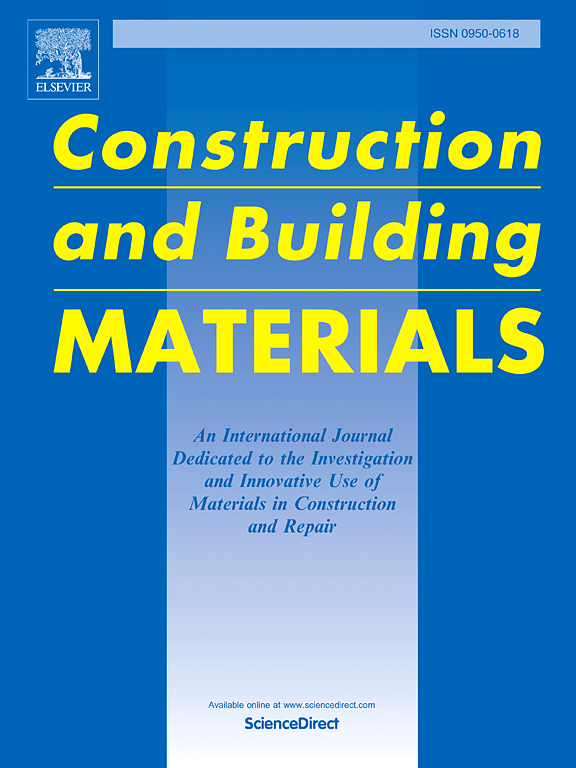Enhancing magnesium oxalate cements with copper slag and silica fume
IF 8
1区 工程技术
Q1 CONSTRUCTION & BUILDING TECHNOLOGY
引用次数: 0
Abstract
Magnesium oxalate cement is an alternative binder made by reacting dead-burned magnesia and oxalic acid salts. Dead-burned magnesia, which has a high carbon footprint, was replaced at different levels (25–100 %) with copper slag, as a source of iron and thus a reactive component, or silica fume, as an inert or low-reactivity component. The powder mixtures contained ∼25–35 % oxalate, by mass. Physical and mechanical properties were investigated as well as changes in the mineralogy and morphology of paste and mortar specimens. Replacement of up to 50 % of dead-burned magnesia yielded strong (> 30 MPa) and water-resistant mortars with extended setting times, for mixtures with lower oxalate content. Mixtures with higher oxalate content and those without any dead-burned magnesia suffered significant strength loss in water. When copper slag was used, humboldtine, an iron oxalate, formed instead of or in addition to glushinskite, the main reaction product of magnesium and oxalate ions. Silica fume did not yield any crystalline reaction products.
用铜渣和硅灰提高草酸镁水泥的强度
草酸镁水泥是一种替代粘结剂,由死焙氧化镁和草酸盐反应制成。死烧菱镁具有较高的碳足迹,在不同程度上(25%-100%)被铜渣或硅灰取代,前者是铁的来源,因此也是活性成分,后者是惰性或低活性成分。按质量计算,粉末混合物中的草酸盐含量为 25-35%。对物理和机械性能以及浆糊和砂浆试样的矿物学和形态变化进行了研究。在草酸盐含量较低的混合物中,取代高达 50% 的死焙氧化镁可产生强度高(30 兆帕)、耐水性强且凝结时间长的砂浆。草酸盐含量较高的混合物和不含死焙镁的混合物在水中的强度明显下降。在使用铜渣时,形成了草酸铁 "驼峰石",而不是镁离子和草酸根离子的主要反应产物 "冰晶石"。硅灰没有产生任何结晶反应产物。
本文章由计算机程序翻译,如有差异,请以英文原文为准。
求助全文
约1分钟内获得全文
求助全文
来源期刊

Construction and Building Materials
工程技术-材料科学:综合
CiteScore
13.80
自引率
21.60%
发文量
3632
审稿时长
82 days
期刊介绍:
Construction and Building Materials offers an international platform for sharing innovative and original research and development in the realm of construction and building materials, along with their practical applications in new projects and repair practices. The journal publishes a diverse array of pioneering research and application papers, detailing laboratory investigations and, to a limited extent, numerical analyses or reports on full-scale projects. Multi-part papers are discouraged.
Additionally, Construction and Building Materials features comprehensive case studies and insightful review articles that contribute to new insights in the field. Our focus is on papers related to construction materials, excluding those on structural engineering, geotechnics, and unbound highway layers. Covered materials and technologies encompass cement, concrete reinforcement, bricks and mortars, additives, corrosion technology, ceramics, timber, steel, polymers, glass fibers, recycled materials, bamboo, rammed earth, non-conventional building materials, bituminous materials, and applications in railway materials.
 求助内容:
求助内容: 应助结果提醒方式:
应助结果提醒方式:


